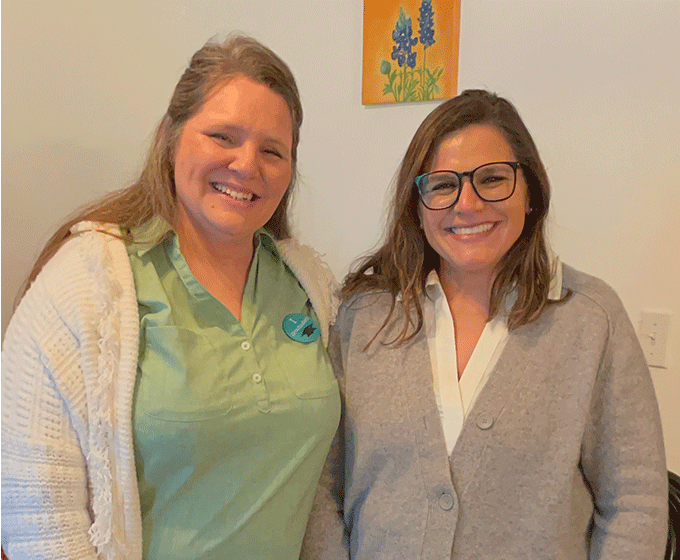
Tina Rodgers (left) joined the Macromolecular Bio-Interfaces lab of Gabriela Romero Uribe (right) midway through graduate school. That's when Rodgers decided to pursue a doctorate in biomedical engineering.
DECEMBER 2, 2022 — It was 2012 and Tina Rodgers wasn’t happy. She was sitting in the UTSA library working through her bachelor’s degree and noticed fellow students around her smiling, but she didn’t feel the same way.
Rodgers was 35 with four children when she transferred to UTSA. Her plan was to become a doctor. She would continue toward her master’s degree and head to medical school.
But her path took a different route.
The three-time UTSA alumna recently defended her dissertation and will be graduating with a doctorate in biomedical engineering this month.
“I was a high school dropout. I was pregnant my junior year so I dropped out,” Rodgers said. “I did it the opposite way than the traditional route. But I did it. My dad was always wanting me to go to school. When I dropped out, I told my mother I would go to school, but she believed I would never go back.”
She added, “I wanted to be an M.D. because my father died of leukemia. Before he died, he told my husband that I was smart and should go to college. My husband put that bug in my ear that I needed to go. Then, my father-in-law passed from cancer and my mother-in-law passed from cancer as well. But through research, I found, I could help people more through this route.”
A series of instances continued to spur Rodgers’ interest in medical research and the body’s capacity to heal itself. She first became acquainted with biomechanics when her son sustained trauma to his leg from a roll-over accident on a utility task vehicle (UTV). He split his leg open and broke his tibia, leaving a large gap in the bone. The treatment entailed a contraption that Rodgers would turn regularly to connect the bone together.
Through his recovery, Rodgers became fascinated with how mechanical methods contributed to and advanced health care treatment.
“That’s what drew me in. If I’m able to help anybody, in any way, I didn’t need to go into medicine. I could do it as a biomedical engineer,” she said.
The timing aligned with a new biomedical engineering degree at UTSA. Rodgers was part of the second cohort of students to graduate from the undergraduate program.
Then, midway through graduate school, she met Gabriela Romero Uribe. She joined the Macromolecular Bio-Interfaces lab of Romero, an assistant professor in UTSA’s biomedical engineering and chemical engineering departments, and witnessed how much further research could take medical treatments. It was settled. With encouragement from her husband and Romero, Rodgers decided to pursue the route toward her doctorate.
Her recently defended dissertation was on engineering biomimetic carriers as gene editing platforms for treating brain tumors. Treatments for brain cancer involve surgery, followed by radiation concurrent with chemotherapy. But glioblastoma, a type of rapidly growing tumor that is behind the blood brain barrier, only lets about two percent of molecules through, hindering the impact of treatment.
Rodgers wanted to find a way to treat this disease. She engineered a nonviral, noninvasive treatment to cross the blood brain barrier and target the glioblastoma cancer cells. Using a 3D in vitro blood brain barrier model, Rodgers presented the approach that would help eliminate further damage to healthy brain tissue and the need for invasive measures.
For 12 years, UTSA has been a home for Rodgers. She is affectionately called mom by other students she’s mentored and encouraged to continue their owns paths in education. Now, she’s headed to Brooke Army Medical Center as a postdoc, where she will work on projects at the intersection of nanotechnology and devices for medical treatments.
“It’ll be bittersweet but I’m excited. It’s fascinating how much trauma a body can go through and how it can heal itself. You can mangle the body and you can put it almost back to normal. I was mangled too, not broken, but there was a lot I’ve gone through in the last 30-something years that I had to overcome. But it was something I wanted to do. I had a mindset that no matter what, I’m going to do this,” Rodgers said.
UTSA Today is produced by University Communications and Marketing, the official news source of The University of Texas at San Antonio. Send your feedback to news@utsa.edu. Keep up-to-date on UTSA news by visiting UTSA Today. Connect with UTSA online at Facebook, Twitter, Youtube and Instagram.
Move In To COLFA is strongly recommended for new students in COLFA. It gives you the chance to learn about the Student Success Center, campus resources and meet new friends!
Academic Classroom: Lecture Hall (MH 2.01.10,) McKinney Humanities BldgWe invite you to join us for Birds Up! Downtown, an exciting welcome back event designed to connect students with the different departments at the Downtown Campus. Students will have the opportunity to learn about some of the departments on campus, gain access to different resources, and collect some giveaways!
Bill Miller PlazaCome and celebrate this year's homecoming at the Downtown Campus with food, games, giveaways, music, and more. We look forward to seeing your Roadrunner Spirit!
Bill Miller PlazaThe University of Texas at San Antonio is dedicated to the advancement of knowledge through research and discovery, teaching and learning, community engagement and public service. As an institution of access and excellence, UTSA embraces multicultural traditions and serves as a center for intellectual and creative resources as well as a catalyst for socioeconomic development and the commercialization of intellectual property - for Texas, the nation and the world.
To be a premier public research university, providing access to educational excellence and preparing citizen leaders for the global environment.
We encourage an environment of dialogue and discovery, where integrity, excellence, respect, collaboration and innovation are fostered.